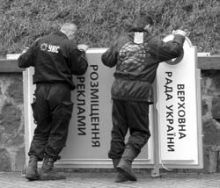During the next plenary week Yulia Tymoshenko, the leader of the BYuT opposition bloc, will renew her attempt to submit a draft law to abolish parliamentary privileges but will take into consideration her colleagues’ wishes and amendments. Recently, voting on a similar draft formulated by Tymoshenko failed. The Party of Regions’ members and some Our Ukraine MPs appeared to be reluctant to lose their fringe benefits. The result of the next debate on parliamentary privileges will soon be publicized. However, experience shows that, when it concerns them, parliamentarians dislike economizing.
No matter how hard the opposition in the form of the BYuT tried to slash the numerous benefits of MPs and expenses tied to maintaining the parliamentary apparatus, nothing worked. The Verkhovna Rada increased its expense budget for next year by UAH 200 million. This year taxpayers spent UAH 606 million on their parliament. The parliamentarians decided to allocate UAH 801.7 million to fund their activities in 2007. Our MPs reluctantly cut the 2007 draft budget of UAH 834 million, as calculated by the State Affairs Agency, by a paltry UAH 33 million instead of UAH 300 million, as suggested by the BYuT.
Ukraine’s parliamentarians will not lose their bonuses either. Parliamentary speaker Oleksandr Moroz’s flights alone will cost UAH 2 million a year. Rank and file MPs will fly free in economy class.
Besides flying for free, the opposition is targeting other perks. The main parliamentary privilege is immunity, which opens an immense field of opportunities. Protected by their immunity, our parliamentarians actively lobby their own business interests and often support somebody else’s business venture-and definitely not for nothing.
In addition, owners of parliamentary mandates enjoy other, no less attractive, privileges. Every Member of Parliament has the legal right to obtain yearly health treatments valued at UAH 10,000.
Parliamentarians’ telephone bills are also paid by the state, except for their cell-phones. There are some restrictions, however. Telephone bills should not exceed 3,000 hryvnias a year. An MP has access to 220 hours of free transportation by car a year. In practice, both telephone and transportation privileges are used not just by parliamentarians but also their assistants, and not only for business but for personal needs as well.
Another source of perks is reimbursement of expenses for performing their duties — about UAH 60,000 per deputy a year.
Arguably the most favorite privilege granted to parliamentarians is the right to housing at the taxpayers’ expense, i.e., ours. Notably even the champions of their electors’ interests, whose real estate is scattered all around the world, accept the housing perk with undisguised pleasure. It is funny to see MPs, who proudly claim to be self- sufficient and even millionaires, rushing to line up for the next roof over their head. In recent years only Volodymyr Boiko, the top executive of the second biggest Ukrainian enterprise (after Kryvorizhstal) Illich MMK, refused to accept this housing perk. In the current, fifth, convocation the BYuT leader has promised that all the MPs in her faction, all 125 of them, will refuse this privilege.
However, not all parliamentarians are struggling to obtain free housing. Many use their right to convert their square meters into a certain amount of hard cash. As a rule, parliamentarians acquire apartments in the most prestigious areas of the capital. Last year, the Regulations Committee reported on a new distribution of apartments among MPs, despite the fact that many of them had already received apartments during their previous terms in parliament. This year a scandal erupted in connection with the building of a “parliamentarians’ village.” Dmytro Rudkovsky, who manages the affairs of parliament, presented a plan according to which this village, valued at UAH 200 million, will be built in the Holosiivsky district of Kyiv in a few years’ time.
Financial aid for former parliamentarians who were not re-elected and have failed to find another job is also part of the packet of privilege. Today this privilege is worth a monthly 5,000 hryvnias per person during the first two years of unemployment. After that the sum is reduced by half, but can be received until the former deputy reaches retirement age. It is easy to guess that the amount of an MP’s pension differs greatly from that of the average Ukrainian. In addition, retired MPs enjoy free medical service and transportation privileges.
Only the chosen ones can enjoy all these privileges. It is highly unlikely that the average Ukrainian will ever join the parliamentarians’ ranks because in order to stick an MP’s badge on your jacket lapel you have to have money-a lot of it. Ihor Popov, the head of the Ukrainian Voters’ Committee, claims that a place in the “go-through” part of a party’s electoral list can be purchased for a sum ranging between UAH 2 and 14 million. The risks are usually shared. For example, the following scheme has been developed for “risky” places: the money is put into a safe, and if the payer does not get into parliament, the money is returned after subtracting 5 — 10 per cent for financing the election campaign.
But even these unbelievable sums spent just to obtain a seat in parliament are “earned back” within a year. As a rule, this is done by lobbying someone’s interests by submitting inquiries or even draft laws.
* * *
“The level of corruption in the Verkhovna Rada is the highest among all bodies of government,” says Taras Klymenko, who heads the Mezha Anti-Corruption Committee (ACM). He claims that this conclusion is based on the results of a survey conducted at the ACM’s request by the Center of Social Expertise at the Institute of Sociology. The survey was aimed at determining the most corrupt levels of authority as well as people whose activities caused the level of corruption and bribery in Ukraine to soar.







